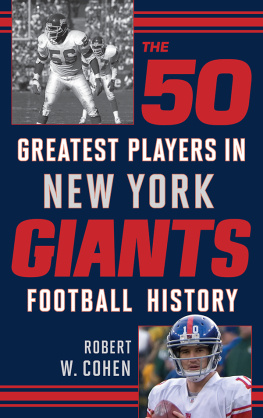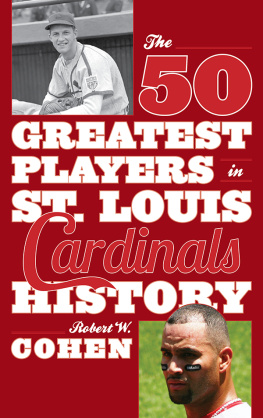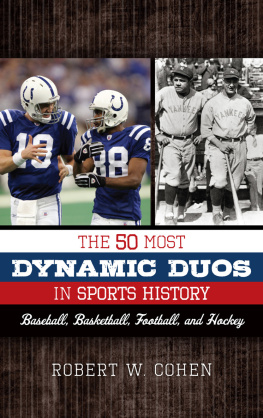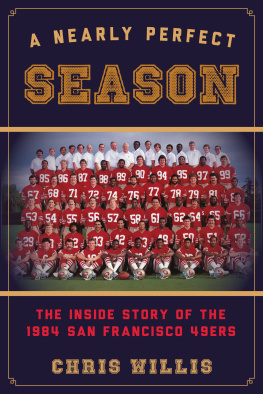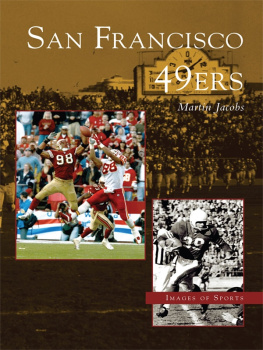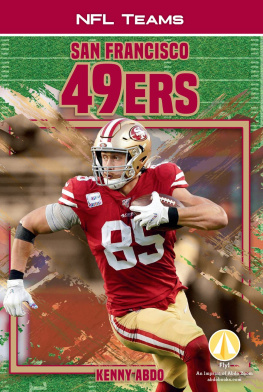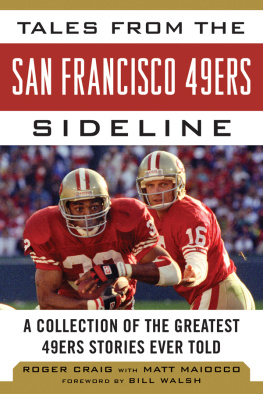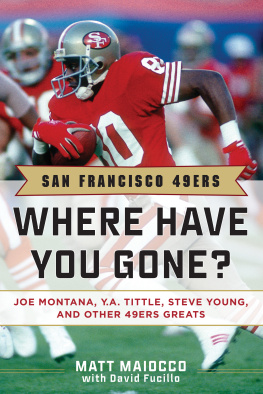T he finest open-field runner of his time, Hugh McElhenny combined with Joe Perry to give the 49ers arguably the NFLs most potent running tandem for much of the 1950s. Nicknamed The King for his greatness on the football field, McElhenny possessed outstanding speed, superb vision, and incredible balancequalities that made him a threat to score every time he touched the football. Surpassing 1,000 yards from scrimmage twice and 1,000 all-purpose yards three times during his nine years in San Francisco, McElhenny continues to rank among the franchises all-time leaders in several offensive categories some 60 years after he played his last game for the 49ers. A five-time Pro Bowler and five-time All-Pro, McElhenny later received the additional honors of having his #39 retired by the 49ers and being inducted into the Pro Football Hall of Fame.
Born to an Irish father and Canadian mother in Los Angeles on December 31, 1928, Hugh Edward McElhenny Jr. began his football career as a 15-year-old, 125-pound freshman at L.A.s George Washington High School in 1943. In addition to starring on the gridiron for the Generals over the course of the next four seasons, McElhenny excelled in track, posting a time of 9.8 seconds in the 100-yard dash, while also setting state high school records in the broad jump, high hurdles, and low hurdles.
Recruited by several major colleges, including Alabama, Notre Dame, Navy, Nebraska, UCLA, Oregon, and Kansas, McElhenny recalled, When I finished high school, I could have gone to any university in the country. After initially accepting a football and track scholarship to USC, McElhenny withdrew from the agreement when the school reneged on its offer to help subsidize him by paying him $65 per month for the ludicrous chore of watering the grass around the Tommy Trojan statue.
A foreign language short of being eligible to participate in college athletics, McElhenny subsequently enrolled at Compton Junior College, where he spent one year starring alongside future NFL teammate Joe Perry in the backfield, helping to lead the Tartars to an undefeated season and a victory in the 1948 Junior Rose Bowl. Making an extremely favorable impression on Tom Harmon during his time at Compton, McElhenny drew praise from the former Heisman Trophy winner, who gushed, Ive never seen such a combination of speed and size.
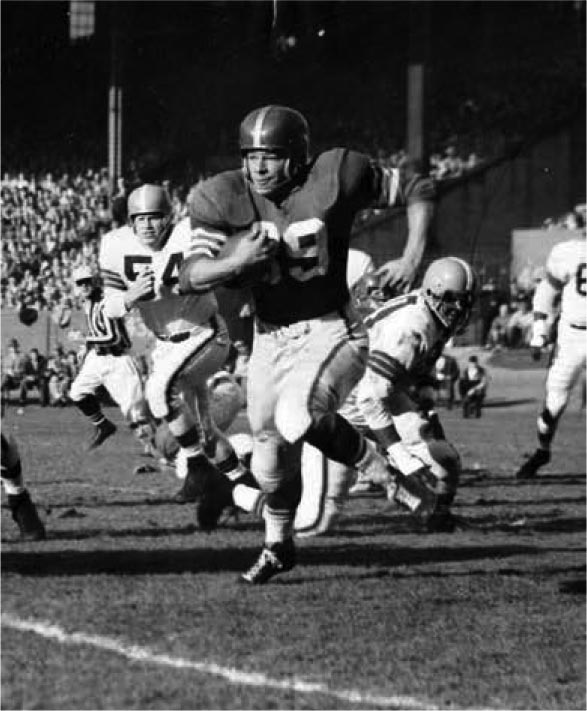
Hugh McElhenny combined with Joe Perry to give the 49ers the NFLs most formidable running tandem for much of the 1950s.
Courtesy of RMYAuctions.com
Choosing to accept an athletic scholarship to the University of Washington following his one year at Compton, McElhenny spent the next three seasons starring at fullback for the Huskies, earning AllPacific Coast Conference honors twice and All-America recognition once by setting then-school records for most rushing yards in a career (2,499) and a season (1,107), while also establishing a single-game school mark that still stands by gaining 296 yards on the ground during a victory over arch-rival Washington State in 1950.
Nevertheless, McElhennys years in Seattle proved to be highly controversial since rumors abounded that the university paid him $10,000 a year for his services. McElhenny also did not get along well with head football coach Howie Odell, who constantly admonished him for showing up late to practice, ignoring training rules, and drinking too much. While McElhenny later admitted to excessive libation, he defended himself against the first charge by explaining that team practices often conflicted with his class schedule.
Paying very little attention to any allegations made against McElhenny, the 49ers made him the ninth overall pick of the 1952 NFL Draft when they selected him in the first round, after which they paired him with former Compton teammate Joe Perry in their offensive backfield. Excelling at halfback alongside Perry his first year in the league, McElhenny earned Pro Bowl, First-Team All-Pro, and NFL Rookie of the Year honors by rushing for 684 yards, making 26 receptions for 367 yards, accumulating another 680 yards returning punts and kickoffs, scoring 10 touchdowns, finishing second in the league with 1,051 yards from scrimmage, and topping the circuit with 1,731 all-purpose yards and an average of 7.0 yards per carry. McElhenny followed that up with another fine season, once again gaining Pro Bowl and First-Team All
Pro recognition in 1953 by rushing for 503 yards, gaining another 474 yards on 30 pass receptions, scoring five touchdowns, and finishing second in the league with 1,449 all-purpose yards.
A separated shoulder suffered during a 3127 loss to the Chicago Bears in Week 6 of the 1954 campaign brought McElhennys season to a premature end, forcing him to miss the final six contests. Sharing playing time with veteran Joe Arenas and rookie Dicky Moegle when he returned to action the following year, McElhenny rushed for only 327 yards and accumulated just 729 yards from scrimmage. However, he rebounded in a big way in 1956, earning Pro Bowl and Second-Team All-Pro honors by amassing a career-high 1,109 yards from scrimmage and finishing third in the league with 916 yards rushing, eight rushing touchdowns, and 1,447 all-purpose yards.
Standing 6'1" and weighing 195 pounds, McElhenny possessed a sculpted body that featured broad shoulders and a 32-inch waist. Blessed with exceptional running speed and extraordinary balance as well, McElhenny posted a personal-best time of 9.6 seconds in the 100-yard dash while in college, which rivaled that of the reigning PCC sprint champion, and regularly defeated Olympic decathlete Bob Mathias in the low and high hurdles during his time at Washington.
McElhennys explosive speed and tremendous agility forced opposing teams to alter their game plans prior to facing the 49ers, with Los Angeles Rams coach Hampton Pool commenting, Preparing for a team that lists McElhenny on the roster, you just cant take any chances.
McElhennys amazing peripheral vision and unique ability to change directions at will also contributed to his ability to navigate his way past opposing defenders, with Joe Perry saying, Mac was the best open-field runner of our era. He was a will o the wisp out there. Sayers was a great open
field runner too, but he was different than Mac. Its hard to pinpoint what it was.
Called the best running back I have seen in a long, long time by former Bears quarterback Johnny Lujack, McElhenny also received praise for his long, graceful stride from Steve Sabol of NFL Films, who referred to him as A true artist of the Gridiron, descendant of Grange, ancestor to Payton, and proclaimed, McElhenny was a Running Back. Almost no one has brought to that calling the same art and bravura that identified his game. They lifted his broken field running to the edge of the concert hall. Somebody said it was the closest approach hes ever seen to ballet on the football field.
Meanwhile, Washington State coach Jim Sutherland marveled at McElhennys extraordinary peripheral vision, stating, If you ever watched McElhenny, youd think he had eyes in the back of his head. Ive seen him cut away from a tackler that 99 percent of the backs wouldnt even have seen. It wasnt instincthe just saw the guy, out of the corner of his eye.
Former 49ers teammate and close friend Billy Wilson addressed another of McElhennys greatest strengths when he said, Theres no question he could do everything. He could change direction on a dime. He had great cutting ability, where other backs were just slashers.
In discussing the attitude that he brought with him to the playing field, McElhenny revealed, My attitude carrying the ball was fear, not a fear of getting hurt, but a fear of getting caught from behind and taken down and embarrassing myself and my teammates.


